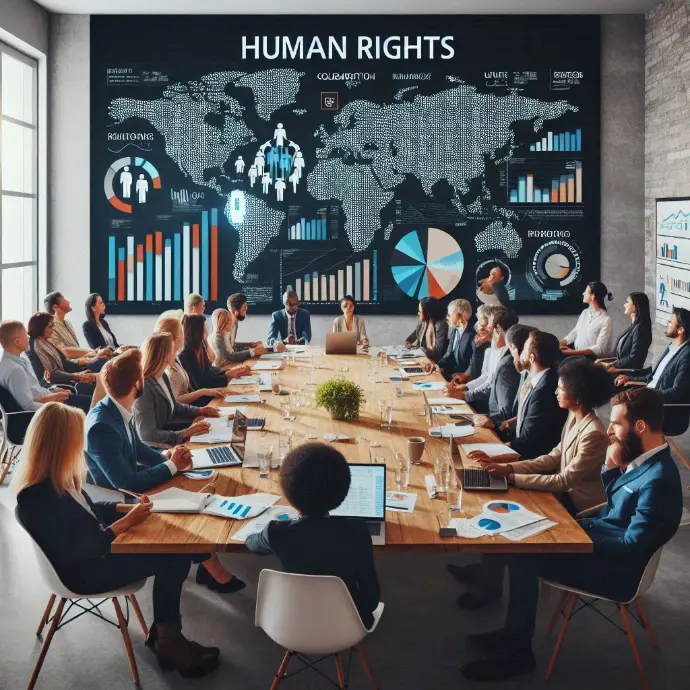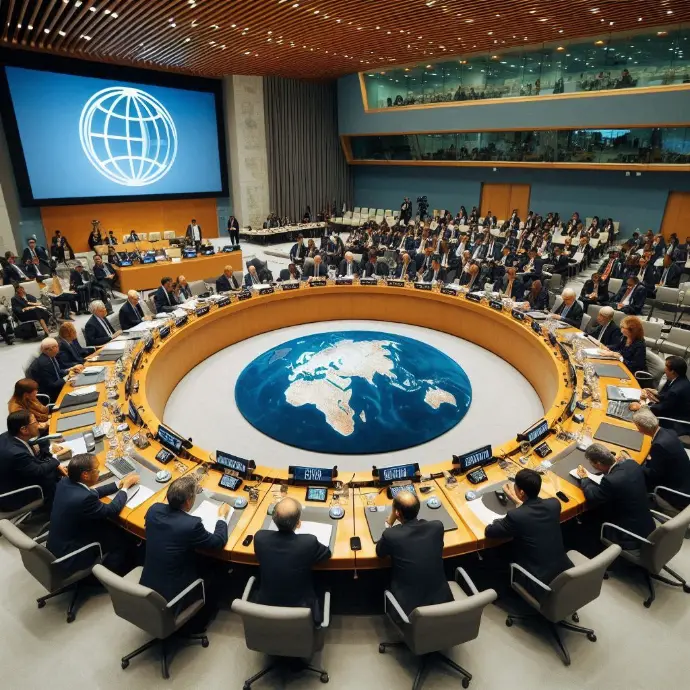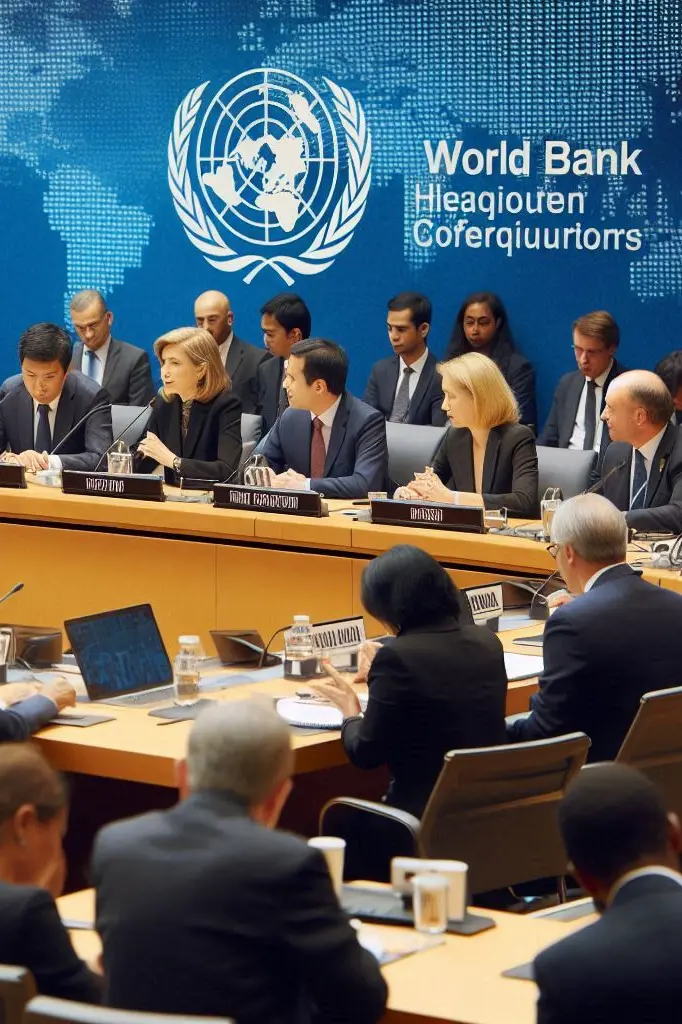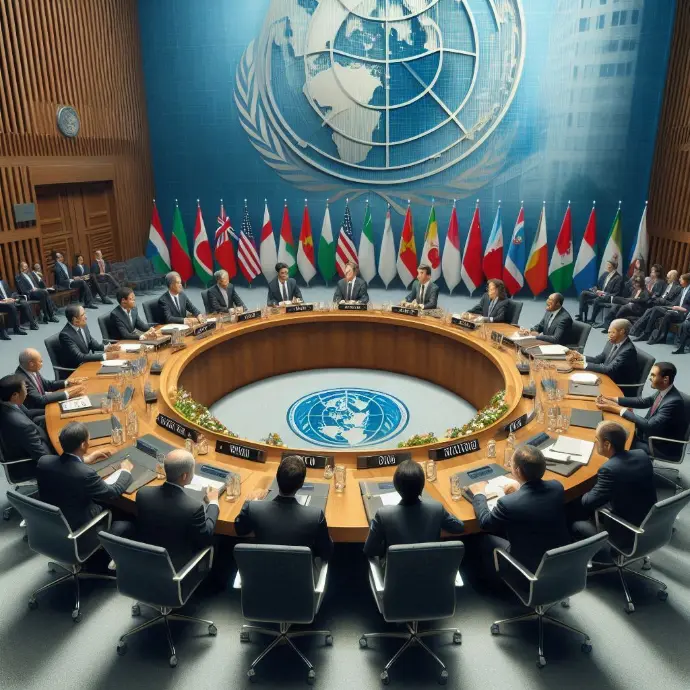The World Bank and Human Rights: Is There a Real Commitment to Human Development?




Here you will find a space dedicated to the exhaustive exploration and in-depth analysis of human rights at the global level. In our main article, "The World Bank and Human Rights: Is There a Real Commitment to Human Development?" we will unravel the relationship between these two entities, seeking to understand whether there is a genuine commitment to human development. Immerse yourself in this fascinating topic and discover the truth behind this important question!
Introduction
We will explore the World Bank's real commitment to human development, analyzing its relationship with human rights over time and highlighting the importance of these rights in its work.
The World Bank plays a crucial role in promoting economic development and poverty reduction in countries around the world. Through its financing and technical assistance programs, the Bank seeks to improve the living conditions of the most vulnerable populations by promoting infrastructure, health, education, and sustainable development projects.
The World Bank's influence on the global development agenda places it in a key position to promote respect for and protection of human rights in all its initiatives. However, the effectiveness and scope of this true commitment to human development are issues that raise questions and critical reflections in the international community.
To assess the World Bank's true impact on human development, it is essential to analyze how human rights have been integrated into its work and how this integration has evolved over time.
Human rights are fundamental to sustainable human development, as they guarantee the dignity, equality, and participation of all people in society. In this sense, the World Bank recognizes the importance of human rights in its work, seeking to align its projects and policies with the principles of non-discrimination, citizen participation, and accountability.
The effective implementation of human rights in World Bank operations is not only an ethical issue but can also enhance the effectiveness and sustainability of its development programs. By promoting inclusion, equity, and community empowerment, the Bank can significantly contribute to advancing human development in all its dimensions.
It is crucial to closely examine how the World Bank has integrated human rights into its policies and practices, as well as the challenges and progress it has experienced in this area throughout its history.
To understand the World Bank's true commitment to human development, it is essential to contextualize its evolution in relation to human rights over time. Since its founding after World War II, the Bank has gone through different stages and has faced criticism and challenges in its approach to human rights in development.
Exploring the background and historical context of the relationship between the World Bank and human rights will provide a comprehensive perspective on its true commitment to human development, allowing us to identify lessons learned and areas of opportunity to strengthen this connection in the future.
By analyzing these aspects in detail, we can gain a more complete and informed view of the World Bank's role in promoting and protecting human rights globally, as well as its genuine commitment to human development in all its dimensions.
The World Bank's Commitment to Human Development
The World Bank defines human development as a process of expanding people's choices and enhancing their capabilities and freedom to lead long, healthy, and creative lives. This definition goes beyond simple economic growth, focusing on expanding opportunities for people to live healthy lives, acquire knowledge, and have access to the resources needed to enjoy a life of dignity. According to the World Bank, human development also involves creating an environment in which people can develop their full potential and lead productive lives consistent with their needs and interests.
The World Bank's approach to human development is based on the notion that economic growth alone is not enough to improve people's quality of life, and that issues such as education, health, gender equality, and environmental sustainability must be addressed to achieve sustainable and equitable human development.
In this regard, the World Bank has adopted a comprehensive approach to human development that goes beyond traditional economic indicators, seeking to promote development that benefits all sectors of society, especially the most vulnerable.
The World Bank has implemented a series of programs and actions aimed at promoting human rights and human development worldwide. These programs cover areas such as education, health, social protection, gender equality, sustainable development, and social inclusion, among others.
For example, the World Bank has financed projects to improve access to education in developing countries, with the goal of reducing the education gap and ensuring that all children have the opportunity to receive a quality education. It has also supported initiatives to strengthen health systems and improve access to health care services, especially in rural and low-income communities.
Furthermore, the World Bank has promoted policies and programs aimed at combating poverty, reducing income inequality, and promoting social inclusion, recognizing that poverty eradication is fundamental to ensuring the full enjoyment of human rights for all people.
While the World Bank has made significant efforts to promote human development and human rights through its policies and programs, it has also been the subject of criticism and controversy regarding the impact of some of its policies on the ground.
Some critics argue that the structural adjustment policies promoted by the World Bank in past decades had negative effects on human development in certain countries, focusing on macroeconomic stability at the expense of social protection and the rights of the most vulnerable. These criticisms have led the World Bank to review and adjust its approaches and policies, recognizing the need to ensure that its interventions effectively promote human development and protect people's rights.
Despite criticism, the World Bank has demonstrated a continued commitment to human development, adapting its strategies and policies to address current challenges and promote sustainable, inclusive, and people-centered development. Its efforts to integrate human rights considerations into its operations demonstrate a genuine commitment to human development on a global scale.
When exploring the World Bank's commitment to human development, it is important to consider the semantic variations that may arise when addressing this topic. A real commitment to human development can manifest itself in various ways, such as the effective implementation of policies that promote equal opportunities, poverty eradication, equitable access to education and healthcare, among other aspects fundamental to the well-being of people around the world.
Furthermore, it is crucial to examine whether the actions and programs promoted by the World Bank are aligned with a genuine commitment to integral human development. This entails assessing whether the initiatives seek not only economic growth but also improved quality of life, respect for fundamental rights, and long-term sustainability. In this sense, it is relevant to analyze the extent to which the well-being of communities is prioritized and a people-centered approach is fostered, beyond purely economic indicators.
On the other hand, it is essential to consider the ethical and moral implications of a real commitment to human development. This ranges from transparency in resource management to accountability for potential negative impacts on human rights. A detailed examination of these semantic variations allows us to understand the complexity and breadth of a genuine commitment to human development at the global level.
Critical Analysis
The World Bank's commitment to human development has been the subject of debate and scrutiny for decades. While the institution has implemented programs and policies aimed at promoting economic and social development around the world, its effectiveness in protecting and promoting human rights has been questioned. Despite its focus on poverty reduction and improving living conditions, it has been argued that World Bank policies often overlook crucial human rights considerations, undermining their impact on sustainable human development.
Assessing the effectiveness of the World Bank's commitment to human development requires a detailed analysis of its operations, loans, and programs in relation to the fulfillment of human rights. While the institution has made significant progress in integrating human rights considerations into some of its initiatives, concerns remain about the coherence and effective implementation of these policies in practice.
It is crucial to closely examine the relationship between the World Bank's stated commitment to human development and the tangible results achieved in terms of improved living conditions, access to basic services, and protection of the fundamental rights of the populations affected by its interventions.
When analyzing the World Bank's commitment to human development, it is essential to address the ethical and moral considerations underlying this issue. Human rights cannot be separated from the ethical and moral principles that govern international relations and decision-making in the development field. It is crucial to assess whether the World Bank's actions and policies are aligned with universal ethical principles, such as justice, equity, and human dignity.
Ethics and morality play a fundamental role in promoting a genuine commitment to human development, as they guide decisions toward outcomes that benefit people equitably and sustainably. It is also important to consider how the World Bank's actions impact the most vulnerable communities and whether respect for human rights is prioritized in all development initiatives. Assessing the Bank's true commitment to human development therefore requires a thorough analysis of the ethical and moral considerations that guide the World Bank's policies and practices.
Ultimately, assessing the World Bank's commitment to human development from an ethical and moral perspective is essential to ensuring that decisions and actions promote dignity, justice, and equality for all people, in line with the fundamental principles of human rights globally.
Challenges and Future Prospects
The World Bank's commitment to human development has faced various risks and obstacles over the years. One of the main challenges has been reconciling economic development objectives with the protection and promotion of human rights. At times, the focus on economic growth has led to decisions that neglect the needs and rights of local communities, especially in large-scale development projects.
Another significant obstacle has been the lack of effective mechanisms to ensure accountability and transparency in World Bank operations. Opacity in decision-making and project implementation has raised concerns about potential negative impacts on human rights, as well as inadequate stakeholder engagement.
Furthermore, the World Bank has been criticized for failing to comprehensively address the structural causes of poverty and inequality, which limits its ability to promote sustainable and equitable human development. These challenges have raised questions about the coherence and effectiveness of the World Bank's commitment to human development and human rights.
To strengthen its commitment to human development, the World Bank could implement a number of improvements and adopt key recommendations. Among them is the need to more effectively integrate human rights impact assessments into all stages of its projects, from planning to implementation and monitoring. This would entail conducting comprehensive analyses of the potential effects of World Bank initiatives on the human rights of individuals, especially those in the most vulnerable communities.
Furthermore, strengthening citizen participation and public consultation mechanisms could help ensure greater transparency and accountability in World Bank operations. Including the voices of civil society, affected communities, and human rights defenders in decision-making would be critical to identifying potential risks and mitigating negative impacts on human rights.
Furthermore, the World Bank could focus on addressing structural inequalities and discrimination, actively promoting gender equality, social and economic inclusion, and the protection of minority rights. These improvements could significantly contribute to a more effective commitment to human development and the protection of human rights at the global level.
Civil society and human rights defenders play a crucial role in promoting and protecting human rights in the context of World Bank operations. Their work includes monitoring World Bank-financed projects, reporting potential human rights violations, and advocating for the interests of affected communities.
Furthermore, civil society and human rights defenders have advocated for meaningful community participation in decision-making regarding development projects, as well as for accountability and transparency in World Bank activities. Its impact has contributed to highlighting the impact of World Bank operations on human rights and promoting reforms aimed at ensuring greater respect for and protection of human rights in the context of development.
In this sense, strengthening collaboration between the World Bank, civil society, and human rights defenders could lead to significant progress in promoting a genuine commitment to human development and the protection of human rights at the global level.
Conclusions
The World Bank has been a key player in global economic development; however, its commitment to human development has been the subject of debate. Over the years, the World Bank has implemented policies and programs to address poverty, education, health, and other aspects related to human development. Despite this, there has been criticism of its focus on economic growth over other fundamental aspects of human rights.
The World Bank has demonstrated a genuine commitment to human development by providing financing for projects that have a direct impact on the quality of life of people in developing countries. However, a thorough analysis is needed to determine the extent to which these projects have improved living conditions and respected human rights in the affected communities.
It is crucial that the World Bank continue to evaluate and adjust its policies and programs to ensure that human development is a priority in all its initiatives. A true commitment to human development not only entails the implementation of short-term projects, but also the adoption of long-term strategies that promote sustainable development that respects human rights in all regions where it operates.
The World Bank's impact on human rights globally is undeniable. Through its financing and technical assistance, the Bank has significantly contributed to the development of infrastructure, health systems, education, and other aspects fundamental to human well-being in numerous countries. However, it is important to recognize that this impact has not been without criticism and controversy.
A true commitment to human development entails not only promoting economic growth but also protecting and promoting human rights at all stages of its projects. This includes the consultation and participation of affected communities, social and environmental impact assessments, and the implementation of safeguards to prevent human rights violations.
Ultimately, the World Bank has a responsibility to ensure that its commitment to human development is reflected not only in its rhetoric and policies, but also in the concrete implementation of its projects and programs globally. Only through a comprehensive approach committed to human rights can the World Bank make a meaningful contribution to sustainable human development worldwide.

 IHRO NEWS
IHRO NEWS